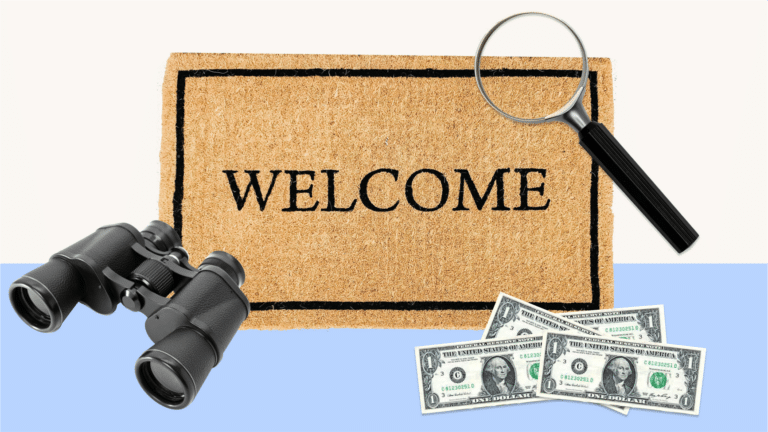What would you do with some extra cash in your pocket? Wipe out your credit card debt once and for all? Update your kitchen? Finally finish your basement? Pay off high-interest student loans or personal loans?
Refinancing your mortgage with a cash-out refinance means you might get to check off all the boxes on your to-do list or give yourself an infusion of cash for upcoming expenses.
In this piece, we’ll tackle your biggest questions: “What is a cash-out refinance?” and “How much money can I get from a cash-out refinance?” We’ll also cover what you can do with the money, the pros and cons of a cash-out refinance and the taxes and steps involved.
Finally, we’ll help you determine if a cash-out refinance fits your needs. Let Morty show you how this type of refinance can fulfill a specific role in your refinance journey or whether you might not want to opt for one at all.
What is a Cash-Out Refinance?
Where does the money “come from” when you get a cash-out refinance?
The most straightforward answer: The amount you can get for a cash-out refinance is determined by the amount of equity you’ve built up in your home. Equity refers to the portion of your property that you own because you’ve paid off that portion of your mortgage.
How does a cash-out refinance work? Put simply, you replace your current mortgage with a larger one and take the difference between the two mortgages in cash. With the money from the new, bigger loan, you pay off your mortgage lender with funds from the new mortgage company you are using. When you use the same lender, you accept the difference in cash.
Once you do that, you’ll have some money left over. You can then use your “cash out” money however you want.
Here’s an example of how cash out refinancing works:
Let’s say you have a current mortgage balance of $150,000. You refinance for $180,000 and receive the difference, $30,000, as your cash-out amount, minus closing costs.
Note that you cannot withdraw all the equity in your home in a lump sum, however. You can only access a limited amount of your home equity, which we’ll go over next.
How Much Money Can You Get From a Cash-Out Refinance?
You can take out a new loan for up to 80% of the value of your home in a conventional cash-out refinance. (A conventional loan refers to a loan not backed by a government entity.) Lenders call this percentage your “loan-to-value ratio,” or LTV ratio.
Your LTV ratio measures the amount of loan you take relative to the value of your property. You calculate LTV using the following formula: (Loan Amount Property Value) 100 = LTV
A VA loan, which is a loan backed by the Veterans Administration for qualifying military members, veterans and spouses, also has a cash-out refinance option. With a VA cash-out refinance, your lender may allow you to take out up to 100% of your equity as cash back at closing.
What Can I Use the Money for?
You can use the money for a variety of needs that might fit your life or specific circumstances. Here are some suggestions for ways you can use your cash-out money:
- Home remodeling: Many homeowners choose to update real estate, whether they plan to sell soon or are wanting to remodel their home for personal use.
- Emergency expenses: You may encounter an emergency that incurs additional expenses, such as a medical emergency, losing a job, car expenses or having to pay for funeral expenses due to a death in the family.
- Debt consolidation: Consolidating debt means that you pay off multiple sources of high-interest debt with a single payment. Debt consolidation through a cash-out refinance might offer an ideal way to replace high-interest debt with a lower interest rate. This can potentially help you reduce your total debt and reorganize it so you can pay it off faster.
- Down payment: You may consider using your cash-out refinance to purchase a rental property or a vacation home. The money from your cash-out refinance can go toward a down payment for a second home.
- Add to existing investments: You may want to consider pulling money out of your home equity to invest. For example, you may feel behind on retirement savings and want to increase the amount you save for your golden years.
You may identify other ways to use the money in your home — these options aren’t the only ways you can use your home equity. You can use the money for pretty much anything you want.
Pros and Cons of Cash-out Refinance
Before you apply for a cash-out refinance, you will want to keep the pros and cons top of mind.
Pros of Cash-Out Refinance
Two of the biggest advantages of a cash-out refinance include giving you the ability to consolidate debt and access cash. Let’s take a look:
- Consolidate debt: A cash-out refinance enables you to replace high-interest debt with lower-interest mortgage debt.
- Access cash: Another major benefit to using a cash-out refinance might seem like the most obvious: You get access to cash that you can use for any general purpose you see fit.
Cons of Cash-Out Refinance
Let’s take a quick look at the downsides to cash-out refinancing.
- New loan terms: Refinancing through a cash-out refinance means you replace your current loan with a new loan. With this new loan, you’ll receive new loan terms. You have the ability to opt for a longer or shorter repayment period. For example, you may choose to switch from a 30-year mortgage to a 15-year mortgage or you might go from a 15-year mortgage to a 20-year mortgage. Note that if you extend your mortgage loan term, you might avoid a higher interest rate but you’ll owe more in interest over the life of your loan.
- Costs of refinance: You’ll have to pay closing costs, which cover various fees, the appraisal and other expenses.
- Private mortgage insurance (PMI): Some lenders let you take out a cash-out refinance amount of more than 80% of your home loan. In this case, you may need to consider the costs of private mortgage insurance (PMI). PMI is a monthly payment that you pay to your lender as insurance in case you default on your loan.
Here’s how this can work: Let’s say your home is valued at $150,000 and you opt for a cash-out refinance for more than $120,000. In this circumstance, you’ll have to pay for PMI.
Cash-Out Refinancing and Taxes
Though you don’t report the money you receive from a cash-out refinance to the IRS as income (because it’s a loan) you may find that you’re limited in your deductions with a cash-out refinance.
Capital improvements — improvements that increase the value of your home — can give you the best benefit from cash-out refinancing because you may be able to tap into available tax deductions. Take a look at IRS Publication 936 for more information.
Requirements of Cash-Out Refinancing
What does a lender want to know before you get a cash-out refinance? A lender will take a look at your credit score, debt-to-income ratio and home equity.
- Credit score: Your credit score is a three-digit number that represents how well you pay back debt. Your credit score can range from 300 to 850, and different types of loans require different credit scores.
- Debt-to-income (DTI) ratio: Your DTI ratio refers to the percentage of your debt obligations that you spend compared to your monthly gross income. Your DTI ratio should stay as low as possible because your lender wants to make sure you don’t take on too much debt.
- Home equity: Your lender will divide your current mortgage balance by the market value of your home to determine your home equity. Let’s say your current mortgage balance is $100,000 and your home’s market value is $200,000. You have 50% percent equity in your home.
You may want to use a refinance calculator to determine the right mortgage for you.
Frequently Asked Questions About Cash-Out Refinancing
Are cash-out refinancing rates higher?
Yes, cash-out refinance rates are slightly higher than rate-and-term refinance rates. Lenders consider cash-out refinancing to be more risky and therefore carry slightly higher interest rates.
Can cash-out refinancing be used for anything?
Yes. You can use cash-out refinancing for a variety of needs, whether you want to consolidate debt, remodel a part of your home or pay emergency expenses.
Can I get a cash-out refinance with bad credit?
A bad credit score could limit your refinance opportunities. You may want to consider improving your credit score and applying once your credit is higher.Morty doesn’t currently offer cash-out refinancing, renovation loans or home equity lines of credit. If you previously closed a home purchase with Morty, you could be eligible for a refinance. Consider checking your rates and let Morty walk you through the steps.







